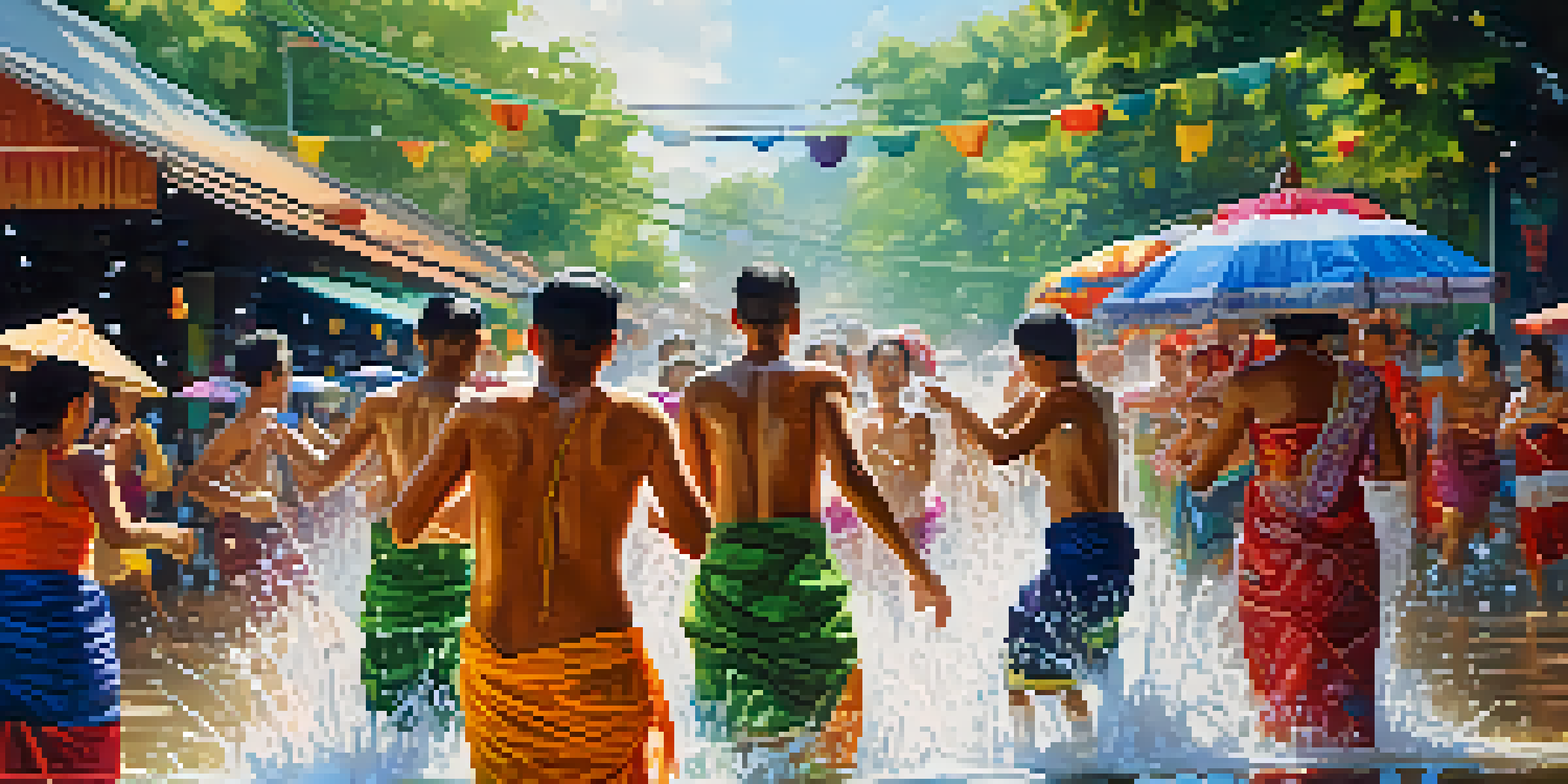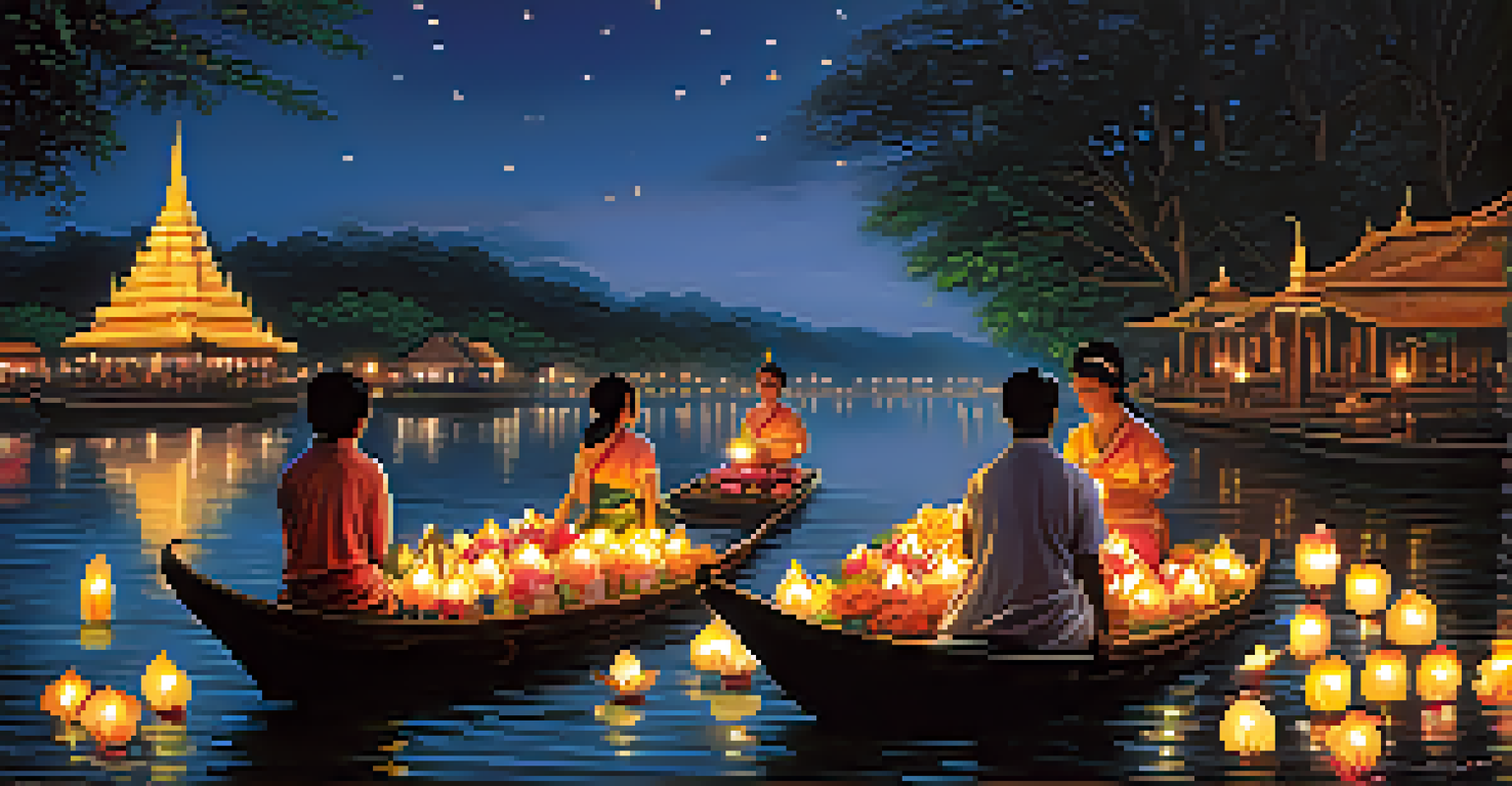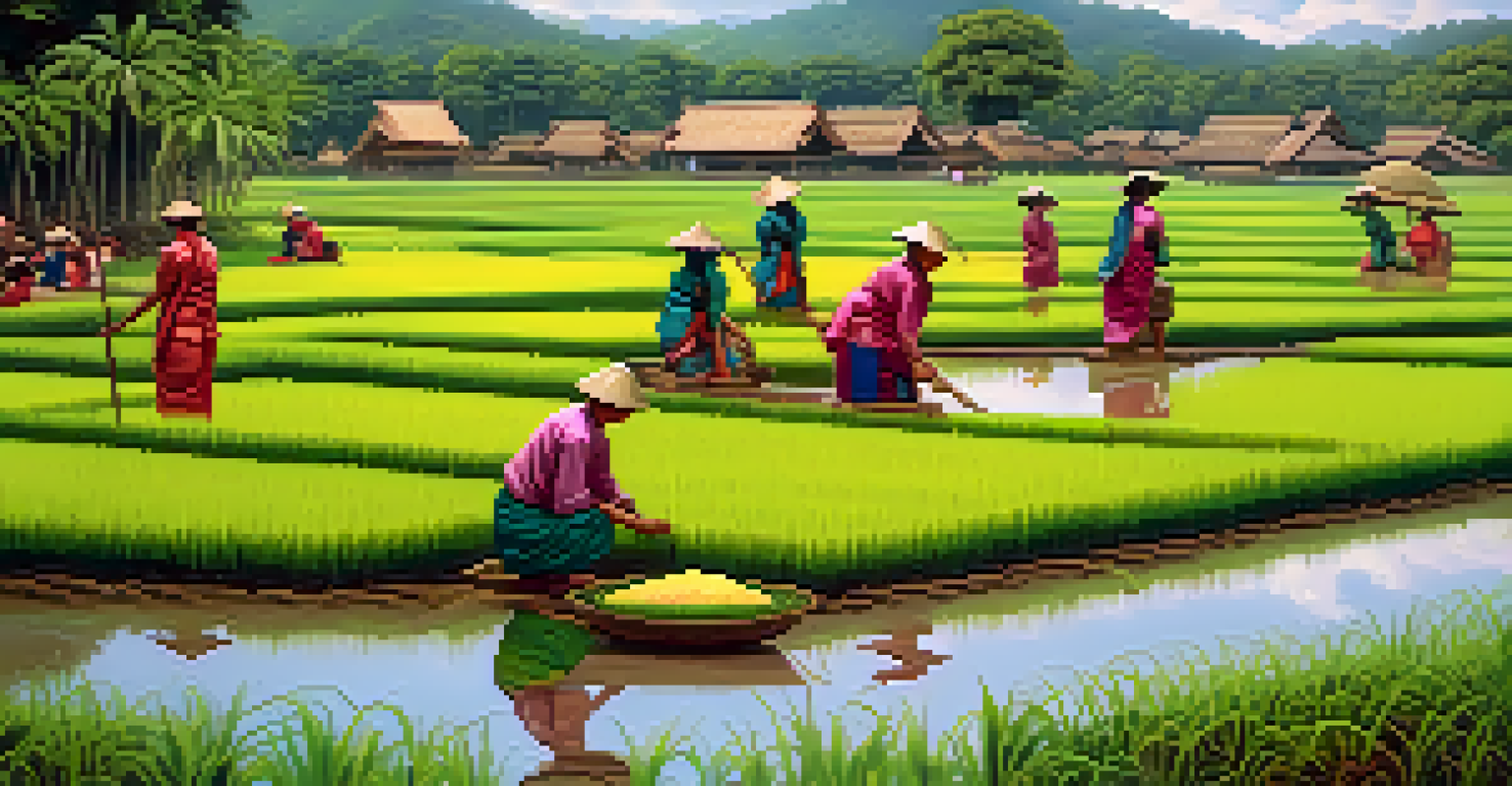The Role of Spirits in Thai Festivals and Traditions

Understanding the Spiritual Beliefs in Thai Culture
In Thailand, spirituality is deeply woven into the fabric of daily life, influencing everything from family structures to community events. Thai people believe in a rich tapestry of spirits, including ancestors and natural spirits, which play a significant role in their cultural practices. This belief system manifests in various forms, such as animism and Buddhism, creating a unique blend that shapes how festivals are celebrated.
In every culture, the spirits of our ancestors are alive in the memories and rituals we practice.
For many Thais, these spirits are seen as guardians who protect their homes and communities. A common practice is to create spirit houses, small shrines placed in homes and businesses, offering food and prayers to these entities. This demonstrates a deep respect and acknowledgment of the spiritual world, reinforcing the connection between the living and the spirits.
As festivals approach, the role of these spirits becomes even more pronounced, guiding rituals and celebrations. Understanding this context is essential for grasping the vibrant tapestry of festivities that characterize Thai culture, where every celebration is infused with spiritual significance.
Major Thai Festivals and Their Spiritual Connections
Thai festivals like Songkran and Loy Krathong vividly illustrate the connection between spirits and cultural celebrations. Songkran, the Thai New Year, involves water splashing as a symbol of purification, believed to wash away bad luck and invite blessings from spirits. This festival encourages people to honor their ancestors and seek blessings for the upcoming year.

Loy Krathong, celebrated on the full moon of the 12th lunar month, involves floating decorated baskets on water. This tradition is a way of thanking the river spirits for their nourishment and seeking forgiveness for any wrongdoings. As the krathongs drift away, it symbolizes letting go of the past and welcoming new beginnings.
Spirituality Shapes Thai Culture
In Thailand, spirituality intertwines with daily life, influencing family structures, community events, and cultural practices.
These festivals not only highlight the importance of spirits but also foster community bonding. Families and friends come together to celebrate, reinforcing social ties while paying homage to the spiritual realm that guides their lives.
The Importance of Rituals in Thai Festivals
Rituals hold profound significance during Thai festivals, serving as a bridge between the physical and spiritual worlds. Each festival features unique rituals designed to appease and honor spirits, ensuring harmony and balance. These rituals can range from elaborate ceremonies to simple offerings, demonstrating respect and gratitude.
Rituals are the threads that weave together the fabric of our beliefs, connecting us to something greater than ourselves.
For instance, during the traditional rice planting festival, farmers may conduct rituals to invite the spirit of the land to bless their crops. This act not only acknowledges the spirit's role in agriculture but also reinforces the community's dependency on nature and its cycles.
Through these rituals, participants reinforce their cultural identity and spiritual beliefs, creating a sense of belonging. The shared experience of engaging in these practices strengthens the community, making each festival a collective celebration of life and spirituality.
The Role of Ancestors in Thai Festivals
In Thai culture, honoring ancestors is a core aspect of spiritual practices, especially during festivals. Ancestors are believed to influence the well-being of their descendants, making their remembrance a vital part of celebrations. During festivals, families often prepare special altars with offerings to invite their ancestors to partake in the festivities.
For example, during the Hungry Ghost Festival, families prepare meals and offer them to their deceased relatives, ensuring they feel welcomed and remembered. This act of remembrance creates a sense of continuity, connecting past generations with the present.
Festivals Connect Spirits and Community
Major Thai festivals like Songkran and Loy Krathong highlight the connection between spirits and cultural celebrations, fostering community bonds.
By honoring their ancestors, Thais not only show gratitude but also reinforce cultural values and family bonds. This practice serves as a reminder of the importance of lineage and the enduring influence of those who came before.
Nature Spirits and Their Influence on Thai Traditions
Nature spirits play an integral role in Thai spirituality, influencing various traditions and practices. These spirits are believed to inhabit trees, rivers, mountains, and other natural elements, reflecting the Thai people's deep respect for the environment. Many festivals incorporate rituals to honor these spirits, ensuring good fortune and harmony with nature.
During the annual planting season, for instance, farmers perform rituals to appease the spirits of the land. These rituals often include offerings of rice and flowers, acknowledging the spirits’ role in providing sustenance and fertility. Such practices underscore the interconnectedness of spirituality and agriculture, vital for the community's survival.
As festivals unfold, the interaction with nature spirits reinforces the bond between the people and their environment. This relationship is fundamental to the Thai way of life, showcasing the importance of respecting and nurturing the natural world.
Modern Influences on Traditional Thai Festivals
As Thailand modernizes, traditional festivals are adapting while still maintaining their spiritual essence. New influences, both local and global, are reshaping how these celebrations are observed. Despite these changes, the connection to spirits remains a cornerstone of these events, preserving their cultural significance.
For instance, the traditional aspects of festivals like Loy Krathong are now enhanced with modern entertainment, attracting both locals and tourists. While the core rituals remain intact, the incorporation of contemporary elements showcases the evolving nature of Thai culture.
Rituals Honor Ancestors and Nature
Rituals during festivals serve to honor ancestors and nature spirits, reinforcing cultural identity and spiritual beliefs within the community.
This blend of old and new creates an inclusive atmosphere, allowing younger generations to connect with their heritage while embracing modernity. Thus, Thai festivals continue to thrive, remaining vibrant celebrations that honor both tradition and innovation.
The Global Appeal of Thai Festivals and Spirituality
The global interest in Thai festivals highlights the universal themes of spirituality, community, and celebration. As people from various backgrounds experience these vibrant events, they gain insight into the rich spiritual heritage that defines Thai culture. This cross-cultural exchange fosters greater understanding and appreciation of different belief systems.
Tourists flock to Thailand during major festivals, drawn not only by the festivities but also by the spiritual significance behind them. The sight of colorful parades, traditional dances, and offerings to spirits captivates visitors, creating memorable experiences that resonate long after they leave.

This global appeal encourages a deeper exploration of spirituality and its role in cultural traditions. As people engage with Thai festivals, they are reminded of the common threads that connect us all, regardless of our backgrounds.
Conclusion: The Enduring Legacy of Spirits in Thai Culture
The role of spirits in Thai festivals and traditions is a testament to the enduring legacy of spirituality in everyday life. As festivals continue to evolve, the fundamental beliefs surrounding spirits remain a guiding force, shaping cultural practices and community bonds. This connection enriches the experience of both locals and visitors, creating a shared appreciation for Thailand's vibrant heritage.
By understanding the significance of these spiritual elements, we gain insight into the values and beliefs that drive Thai society. The rituals and celebrations that honor spirits foster a sense of identity, belonging, and continuity, reminding us of our interconnectedness with the past.
In a rapidly changing world, the spiritual traditions of Thailand offer a beautiful reminder of the importance of honoring our roots and the forces that shape our lives. As we celebrate these festivals, we are not just participating in cultural events; we are engaging in a timeless dialogue between the living and the spirits that guide us.